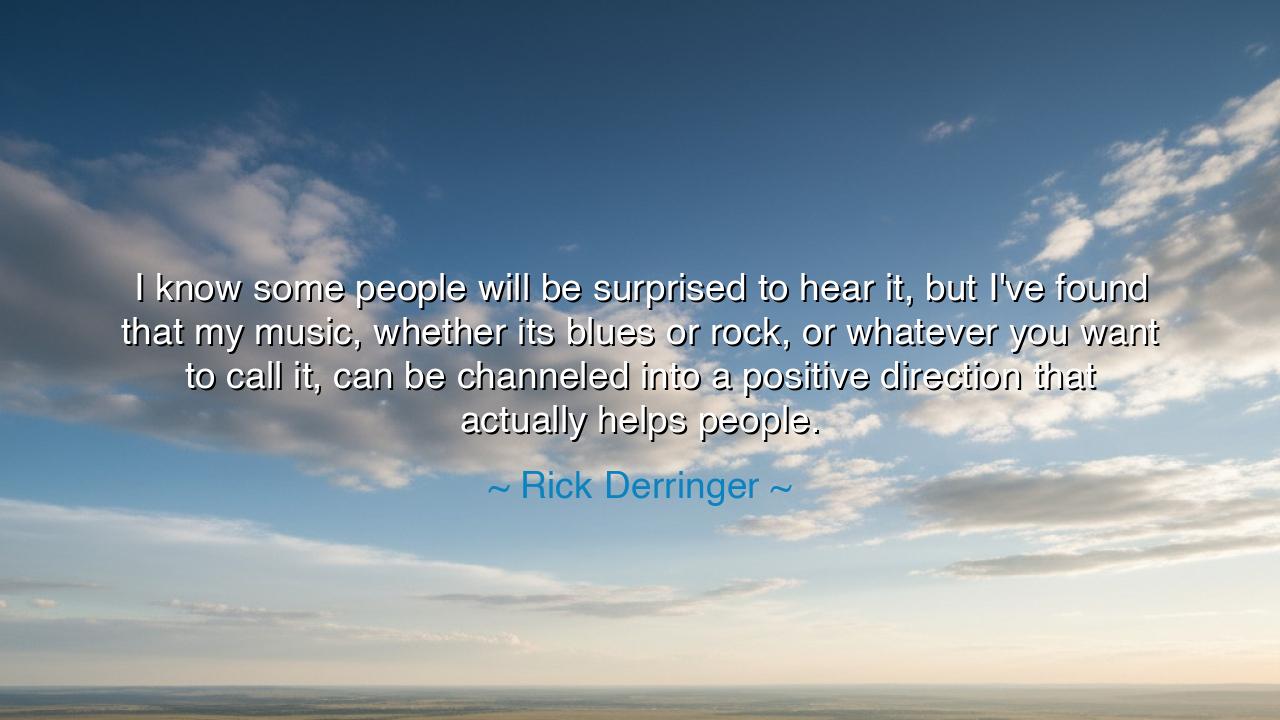
I know some people will be surprised to hear it, but I've found
I know some people will be surprised to hear it, but I've found that my music, whether its blues or rock, or whatever you want to call it, can be channeled into a positive direction that actually helps people.






The words of Rick Derringer — “I know some people will be surprised to hear it, but I’ve found that my music, whether it’s blues or rock, or whatever you want to call it, can be channeled into a positive direction that actually helps people.” — proclaim the ancient truth that art is not mere entertainment, but medicine for the soul. What begins as sound becomes spirit, what begins as rhythm becomes healing. Even when born of sorrow or rebellion, music can be turned toward light, lifting the weary and guiding the lost.
To take blues, a music born from the pain of oppression and the cry of the enslaved, and to draw from it strength and resilience, is to understand how suffering is transmuted into beauty. To take rock, born from defiance and youthful fire, and channel its energy into something life-giving, is to see that passion itself can be sanctified. Derringer’s insight reflects a timeless law: that what springs from darkness may yet be turned toward dawn.
The ancients also knew this. In ancient Greece, the songs of Orpheus were said to calm storms, charm beasts, and soften the hearts of even the gods. His lyre was not just an instrument but a force that bound chaos into harmony. Likewise, the psalms of David, sung upon his harp, were said to drive away the tormenting spirit that plagued King Saul. These stories endure because they reveal what Derringer himself proclaims — that music has the power not only to move, but to heal.
When he speaks of a positive direction, Derringer names the calling of every artist: to choose whether their gifts will inflame destruction or kindle hope. The stage can be a place of vanity, or it can be a temple where burdens are lifted and spirits are renewed. To help people through art is to transcend self and become a vessel for something greater. This is the heroic duty of the creator: to transform raw emotion into shared strength.
Let the generations remember: every song is a seed planted in the hearts of those who hear it. Some seeds grow thorns, others grow fruit. The artist, like a sower, must choose what harvest he wishes to leave behind. Rick Derringer’s words shine as a reminder that the noblest harvest is born when music becomes a balm, when passion is turned toward love, and when the cry of the heart is offered not only as expression, but as gift.






KLKhanh Ly
I like how Rick Derringer challenges the common perception of rock and blues music being purely about rebellion and negative emotions. It’s a reminder that art, in any form, can be a catalyst for good. What do you think it takes for artists to recognize their ability to influence change, and how can they use that power responsibly?
L5Kim Loan. Lop 5.1
This quote from Rick Derringer really highlights the transformative power of music. It’s interesting that he mentions the unexpected way music can be channeled for good. How can musicians use their talents to help others in meaningful ways beyond entertainment? What are some examples where music has led to positive social or personal change?
NPUyen 9/2_39_ Do Ngoc Phuong
Rick Derringer’s perspective on music as a vehicle for positivity is intriguing. It’s often assumed that certain genres, like rock or blues, are more about expressing rebellion or pain, but this quote challenges that notion. Do you think there’s a fine line between the raw expression of struggle and the potential for that to inspire positive change?
UNUyen Ngo
I love the idea that music, especially blues and rock, can have a positive impact on people. But I wonder—what does Rick Derringer mean by 'positive direction'? Is it about uplifting messages in the lyrics, or the feeling that the music evokes in people? What makes certain types of music more likely to help people than others?
TNThu Nguyen
This quote makes me think about how powerful music can be as a medium for change. While blues and rock often express pain and struggle, it’s interesting that Derringer finds a way to channel those same emotions into something that helps people. How do you think music can be used to address societal issues or promote mental well-being?